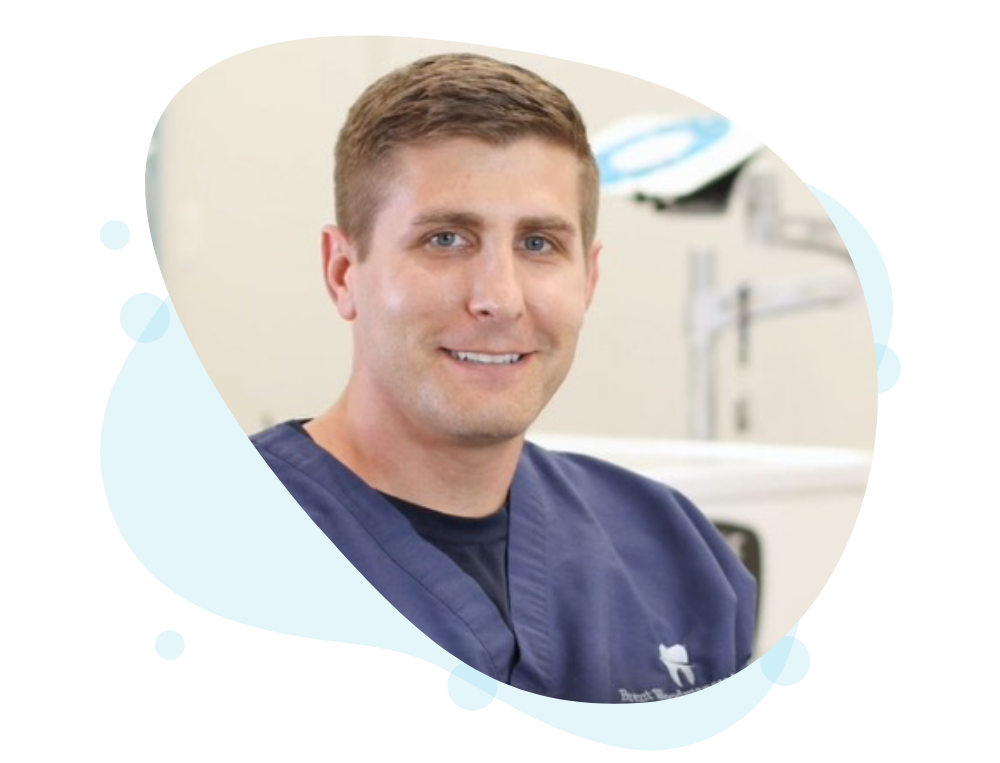
Meet Dr. Woodmansee
The American Association of Oral Surgeons reports that 85% of people require the extraction of their wisdom teeth for a healthy smile!
Dr. Brent Woodmansee is a general dentist who visits our Great Big Smiles offices to provide an affordable and easily accessible option for our patients to have their wisdom teeth removed.
FAQs
What are wisdom teeth?
Wisdom teeth, or third molars, are the last teeth to develop in the mouth. They erupt into the mouth usually around age 17-25. The average mouth does not have enough room for wisdom teeth to erupt properly, which is often referred to as impacted teeth.
Why is it often suggested that wisdom teeth be removed?
Wisdom teeth can be very difficult to keep clean because they are located in the back of the mouth. This often leads to problems before pain or other symptoms let you know something is wrong. Wisdom teeth can contribute to a variety of problems, including:
- Tooth decay
- Periodontal disease
- Infection
- Damage to neighboring teeth
- Bone loss
- Tooth loss
- Crowding of teeth
- Formation of cysts and tumors
Although there are many potential risks associated with wisdom teeth, they do not always need to be removed. After an evaluation, your dentist will be able to give information specific to your situation.
Timing for surgery?
The ideal age to remove wisdom teeth is usually around age 16-18. The longer you wait past these years, the more risky, complicated, and difficult the surgery will be. As we age, the recovery process becomes slower and less straightforward. Due to these factors, your dentist may recommend removal even if they are not yet causing obvious problems.
Should I elect to have my wisdom teeth removed with IV sedation?
Intravenous sedation is also known as conscious, twilight, or IV sedation. It enables you to feel relaxed and comfortable throughout the surgery. Performing the sedation through an IV is the safest and most predicable way to reduce anxiety, awareness, and memory during the procedure.
During the sedation, you will technically be “conscious” so the body can maintain natural reflexes like breathing and swallowing. Many patients, however, are so relaxed they drift in and out of sleep (“twilight sleep”) and are frequently unaware of the dental procedure. The intention is to use the least amount of medication possible, while ensuring the patient is comfortable.
In addition to being affordable and effective, IV sedation is extremely safe, making it an attractive option for many patients. The disadvantages of conscious sedation are the increased cost and need for an escort after the procedure.
Are there pre-operative instructions for wisdom teeth removal?
There are many crucial rules you must follow in order for us to perform the surgery. Please be sure to review all the pre-operative instructions as soon as possible. If you have any questions, please do not hesitate to contact Dr. Woodmansee or his staff.
What is the surgical procedure?
Wisdom tooth removal is often the first surgery many patients experience, making it normal to be nervous. To make your surgery day go smoothly, please ensure you review all the Pre-Operative Instructions as stated above. It also is helpful to read the post-operative instructions to have a better understanding of what to expect. Your surgery day will consist of Dr. Woodmansee reviewing your medical history, discussing expectations, and giving post-operative instructions. Patients are usually in the office around 90 minutes.
What is the post-operative instructions for wisdom tooth removal?
Reading the post-operative instructions prior to your surgery gives you a better idea of what to expect. Please take the time to read all the post-operative instructions to have the smoothest recovery. If you have any questions, please do not hesitate to contact Dr. Woodmansee or his staff.
Are there known risks and complications with the surgery?
Common risks associated with any surgical procedure include swelling, bruising, pain, and bleeding. In addition to the above risks, the following are uncommon but possible complications associated with wisdom tooth removal:
- Infection: Any infection should be taken seriously and immediately reported to your surgeon, who will appropriately treat the problem. Signs of infection include fever, abnormal swelling and pain, salty or prolonged bad taste and pus formation.
- Damage to adjacent teeth: Damage can occur to other teeth close to the ones being removed. Often this damage occurs on teeth that have large fillings.
- Nerve Damage: Numbness, pain, or changed feelings in the teeth, gums, lip, chin and/or tongue (including possible loss of taste). This is because the tooth roots can be very close to these nerves, which means they can be injured or damaged. Usually the numbness or pain goes away over time, but in some cases, it may need more treatment or may be permanent.
- Joint Pain: Jaw joint (TMJ) soreness, tenderness, pain, or locking, which can be temporary or permanent.
- Root Fragments: Sometimes tooth roots may be left behind to avoid harming important structures such as nerves or the sinus (a hollow place above your upper back teeth). This rarely presents long-term problems.
- Sinus Complications: The roots of the upper back teeth are often close to the sinus and sometimes a piece of the root can get into the sinus. An opening may occur from the sinus into the mouth that may need more treatment.
- Jaw Fracture: It is extremely rare that the jaw will break, but it is possible when the teeth are buried very deep in their sockets.
Where does the procedure take place?
Your wisdom teeth extraction will take place right in our Great Big Smiles location, where you are familiar and always have a smile. We are currently only doing these procedures in our Scottsdale office.
How do I get started?
-
Fill out a Health History form (linked here) and email it to tcglendale@gbsmiles.com
-
Once we receive your form, our Treatment Coordinator will send it over with your xray to Dr. Woodmansee.
-
Dr. Woodmansee will review all of the information and send over a treatment plan.
-
Our Treatment Coordinator will verify your insurance and provide you with a treatment plan for your procedure.

